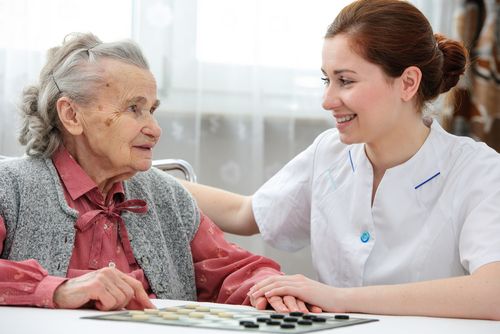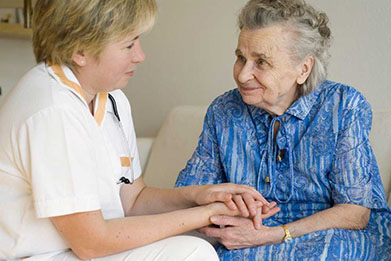“No one else can provide the same quality of care to my loved one that I can give them myself.” Many dementia caregivers genuinely feel that they are the only ones who can care for their loved one. There are almost 15 million people in this country providing unpaid care to a person with dementia. The majority of them will have difficulty coping with the changes that occur as the disease progresses.
Caring for a person with a physical disability is challenging enough. Few people are prepared for the challenges they will face when their loved one begins to lose their identity. During the first stages of dementia, the symptoms may be limited to forgetfulness and an inability to concentrate. They may not be able to complete tasks as efficiently as they used to. Caring for your loved one might be as simple as providing them with medication reminders. You might help them with household chores like cooking and doing laundry.
Failing to accept what is happening to your loved one is a danger to them and to you. Dementia is a progressive disease. During the later stages, your loved one will become more demanding. You will have to do more of the physical tasks they have always done for themselves. Although the physical demands can be overwhelming, many dementia caregivers find the emotional demands to be the most challenging. They often fail to recognize behavior changes until after something happens that could be a danger to their loved one or to someone else. Their denial that their loved one has a serious disease eventually becomes impossible to uphold. As the level of responsibility grows, so does the frustration and stress, and the potential for serious risks.
Greater Risk of Accidents
Elderly people already have a high risk of falling due to a decline in balance, osteoporosis, and vision problems. People with dementia are at an even greater risk of falling. Dementia patients are also three times more likely to sustain a hip fracture. Once walking becomes more difficult, you have to be careful about leaving them unsupervised.
The potential for accidents and injuries increases in every area of the home. The decline in physical abilities coincides with their mental decline. Leaving the stove on, starting fires, cutting themselves with a knife, or eating excessive amounts of odd foods are just some of the things dementia patients do. They may even try to catch you not watching so they can do some of these things and more. You have to watch them constantly to keep them safe.
Dangers from Medications
Most dementia patients are on medications to reduce memory loss. Seniors also take medications for common health conditions like high blood pressure, diabetes, or other conditions. At first, you might use a daily pill dispenser to help keep the dosages straight. All your loved one needs is a reminder when it’s time to take a pill.
Over time, your loved one will be at risk of overdosing. The problem is that you may not realize that today is the day their behavior will change. To keep your loved one safe, the pills need to be put away. Dispensing them on time with every dosage is now your responsibility.
Family Conflict
One child in an entire family acting as the primary caregiver is usually the rule and not the exception. You spend hours with your loved one each day. If your siblings observe from afar and only pay occasional visits to your parent with dementia, they don’t see the impact dementia has had on their life. They might accuse you of overreacting, denying that their parent needs the level of care that you have told them. The only help they offer is advice on what you should or shouldn’t doing. These constant interactions with your siblings or other family members only add to your burden and stress.
Delayed Professional Help
Dementia caregivers have different reasons for denying their loved one’s disease. Misplaced guilt, shame, or simply not wanting to accept the inevitable outcome, to name a few. The time you spend denying your loved one’s dementia is real or that it will get worse is time wasted. Dementia is a progressive disease, caused by damage to brain cells. Once that damage occurs, it can’t be reversed. There are medications, however, that can slow its progression. The sooner you get your loved one the professional treatment they need, the more quality time you will have together. Don’t miss your chance to share special memories with your loved one.
The Impact on a Dementia Caregivers Health
Denial increases the impact that caring for your loved one will have on your health, too. For the reasons listed here, and many others, there is a greater physical and emotional demand than most caregivers anticipate. There’s also a bigger demand on their time, leaving little room to take care of themselves.
Failing to accept the true impact dementia will have on your loved one can damage your health and take years off your own life. The mortality rate for caregivers is 63% higher than for other people with similar demographics. The risk is the greatest for caregivers over the age of 66. Often, they die before the person with dementia does.
Consider Your Options Carefully
The decision to care for a spouse, parent, family member, or friend with dementia in their home isn’t always the best one. The average person lacks the skills to provide the level of services their loved one needs. In comparison, a dementia assisted living facility considers all the potential changes that your loved one goes through. They offer a staff of skilled dementia caregivers and a safe, secure environment. Placing your loved one into dementia assisted living will help keep them active and happy for as long as possible. It also allows you to take on the role of a loved one and enjoy special memories that you would otherwise miss.
If you have a loved one with dementia, contact Lakeside Manor to schedule a tour of our facility. You do have other options that offer a better quality of life to you and your loved one. Let us help you make the most of every minute you have left together.



